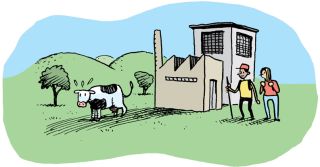Election 2024 - Rural Ireland
Main Image

Page Content
Text
This edition of our Election 2024 Spotlight series examines things a new Government can do to build thriving and resilient rural communities.
Text
The present situation - a snapshot of some key issues
- Rural areas generally have an older population, higher rates of part-time employment, lower median incomes, higher dependency ratios and higher poverty rates than the national average.
- The average distance to most everyday services for people in rural areas is at least three times longer than for people in urban areas. For supermarkets, GPs and pharmacies, the average travel distance was seven times longer for rural dwellings. This raises challenges for delivery of services as our population grows and ages.
- The driver of the rural economy in Ireland has moved from the primarily agricultural to a more diverse base involving services, manufacturing, tourism and others.
- The Midland region and the Border region had the lowest disposable income per person in 2021 (latest available data). Persons in the Border, West, and Midland regions have consistently reported a disposable income below the state average since 2004.
- High earning sectors and above average earning sectors such as ICT and professional services are predominantly concentrated in the Eastern and Southern regions. Agriculture, retail, hospitality, and construction, sectors associated with lower incomes, are more predominant in the Northern and Western Region.
- Supporting rural households to ensure that they have sufficient incomes will be crucial to the future of rural Ireland.
- High quality and connected public transport links, skills development and sustainable regional employment opportunities are vital to the future of rural economies.
What type rural Ireland should we be planning for?
- One where there are viable and resilient rural communities in all parts of Ireland where people have access to meaningful work, adequate income and decent services and infrastructure.
Things a new Government can do to build a thriving and resilient rural communities
- Ensure that investment is balanced between and within regions.
- Ensure rural development policy is underpinned by social, economic and environmental wellbeing.
- Continue to prioritise rolling out high speed broadband to rural areas.
- Invest in an integrated, accessible and flexible rural transport and rural active travel network.
- Ensure that sustainable agriculture policy, sustainable land management, and short supply chains for farmers and consumers form the basis of future agricultural policy.
- Ensure that development initiatives resource areas which are further from the major urban areas to ensure they do not fall further behind.
- Invest in human capital through targeted education and training programmes, especially for older workers and those in vulnerable employment.
- Establish a Just Transition and Adaptation Dialogue to ensure rural areas are not disproportionately impacted by low carbon policies and are supported to meet the challenges posed by the future of work.
- Prepare for the potential impact of technology on the future of work by investing in the regions and ensuring the necessary social, infrastructural and human capital supports are in place to manage any upheaval.
- Provide integrated supports for rural entrepreneurs, micro-enterprises and SMEs.
- Ensure public service delivery in rural areas according to the equivalence principle and that rural proofing is an essential component of all Government policies.
